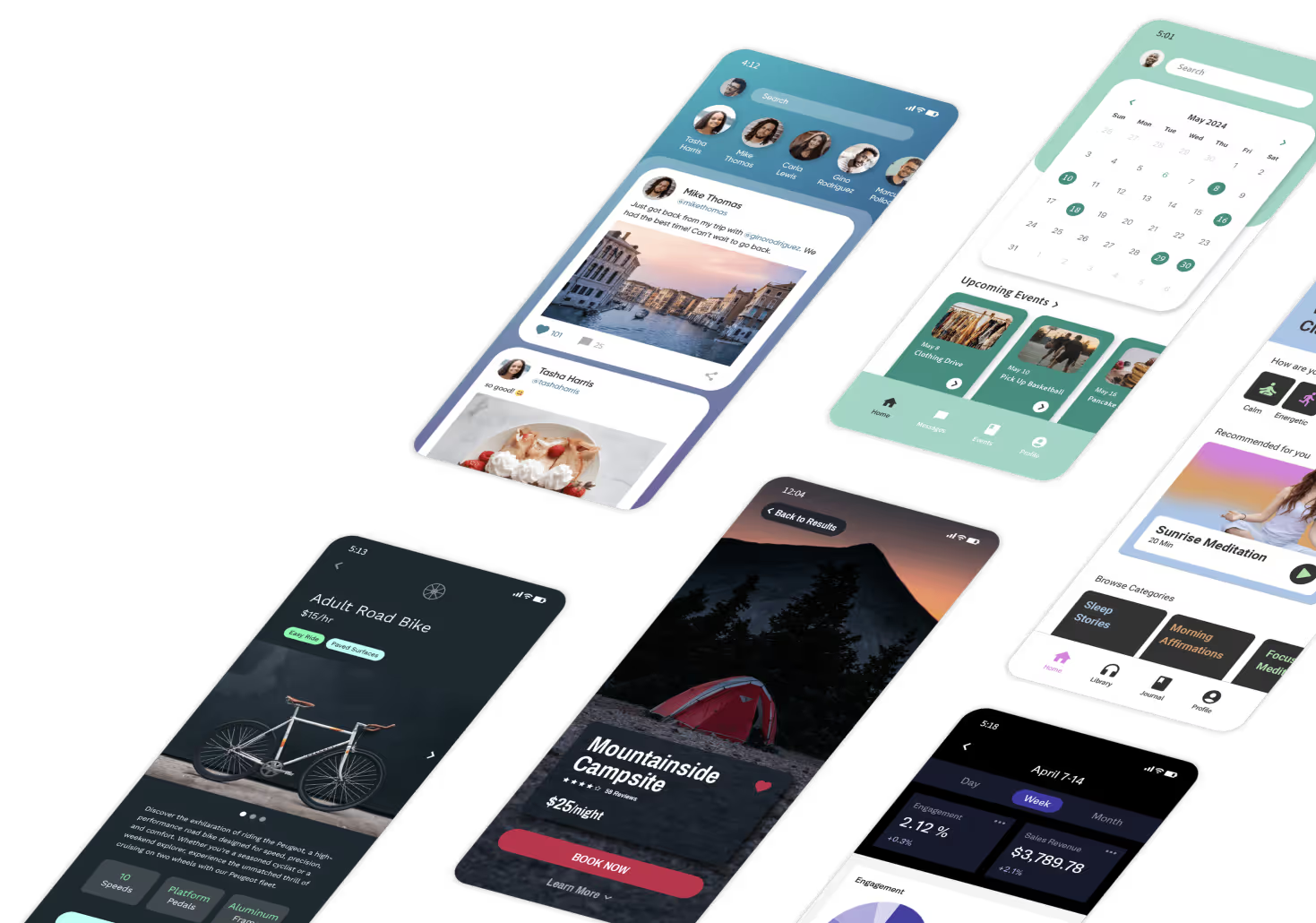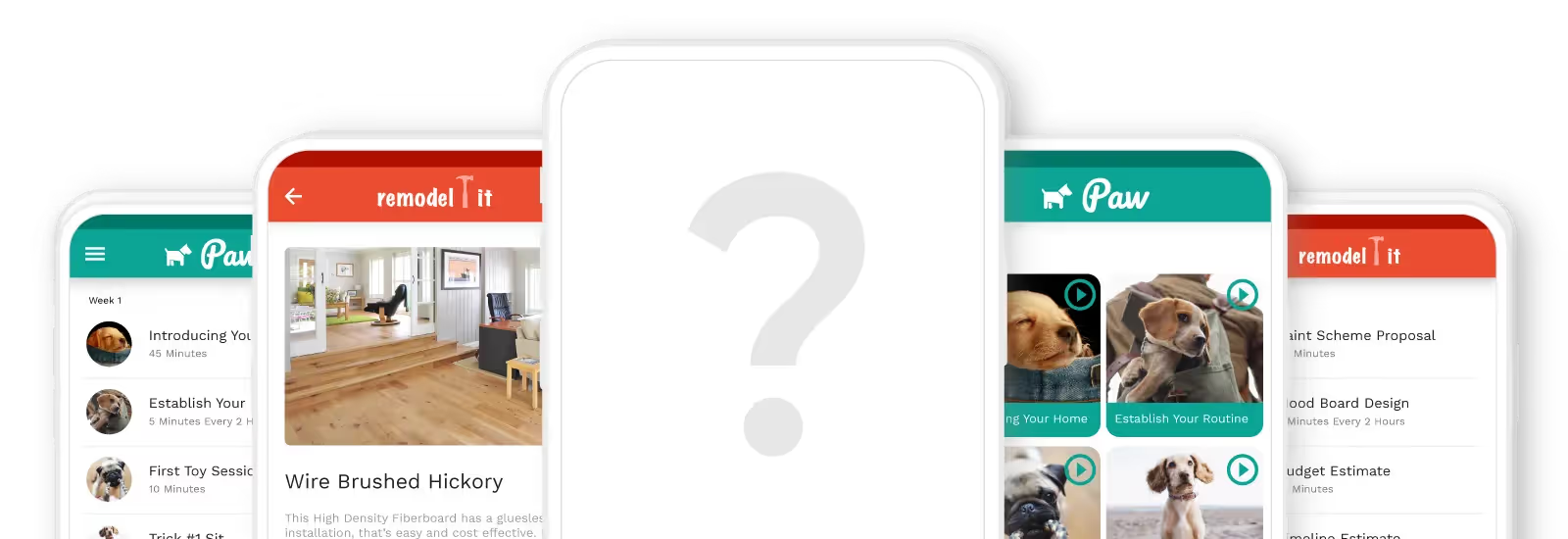
Are you choosing between Justinmind vs. Figma? Understand their strengths: Justinmind offers in-depth testing tools, while Figma integrates seamlessly with iOS. Both offer free versions to try.
Read on to learn more about:
- Similarities
- Differences
- Features, pricing, and audience details
- Adalo, a popular alternative
Justinmind vs. Figma: Similarities
Both Justinmind and Figma offer robust wireframing tools. Wireframing is drawing up digital blueprints for an app you hope to develop. When you make your wireframes, you create mockups of the screens you’ll build when you craft your app with coding or an app-building platform.
Making wireframes allows you to see and feel how your app might appear. While you won’t be able to transfer data using a Zapier integration or an API, and the wireframes are essentially just plans, you will bring your app’s blueprints to life.
Doing this enables you to tinker with and eventually perfect your app’s style, structure, and appearance so you can hit the ground running when you start developing our app.
Because they’re both wireframing tools, Justinmind and Figma share many similarities, including:
- Easy, no-code wireframing tools: Justinmind and Figma require zero coding or technical knowledge. The platforms feature drag-and-drop interfaces that let you move pieces around using your cursor to construct your wireframes without banging your head against the wall.
- Free versions: If you want to try out the building interfaces to ensure they mesh with your expectations without any financial obligations, you’re in luck. Justinmind and Figma offer free versions, not limited-time free trials that let you learn how to use the interface at your own pace.
- Template libraries: You won’t need to start crafting your wireframes from scratch. Justinmind and Figma offer robust libraries full of templates for wireframing several types of apps, like those for fitness, restaurants, e-commerce, and more.
Building your wireframes from a template saves you time, as you’ll be able to hit the ground running.
- Collaboration capabilities: If you’re working with a team, Justinmind and Figma provide features that allow your team to wireframe together in real time. This can optimize your wireframing productivity, enabling you to deliver blueprints to clients rapidly so you can move onto the development stage in no time.
Justinmind and Figma’s Differences
While Justinmind and Figma have a few similarities, both platforms are remarkably different. Here’s a quick table to summarize their differences:
Justinmind
.avif)
Who It’s Good For
Justinmind is well-suited for folks who need a strong tool for creating high-fidelity and complex wireframes. It's also ideal for app development agencies that need a platform with robust testing capabilities.
All the advanced features and functionalities require overcoming a bit of a learning curve, so you’ll need to dedicate some time to learning the platform to squeeze out all its wireframing nectar.
Features
- If you have conceptual drawings with Sketch or Adobe Suit, you can import them into your wireframes, as Justinmind is integrated with these graphic design tools.
- While learning about the building interface takes some time, you’ll get nearly pixel-perfect design freedom, giving you the flexibility to mockup almost any set of wireframes.
- Once you’ve built your wireframes, Justinmind has a testing platform on which you can run them. This can help you optimize your design and app structure and determine where specific functionalities like a chatbot should go.
Pricing
Justinmind pricing starts at $19/month per user (billed monthly), and it provides organization features like version tracking and unlimited wireframe projects.
The second tier, at $29/month per user (billed monthly), is created for teams with techies. It allows you to export your wireframes to HTML code, which you can use to bolster app development. This version also provides white-label branding to tack your logo onto your wireframes.
Figma
.avif)
Who It’s Good For
The Figma Wireframing tool, made by the popular graphic design software company Figma, is designed for everyone, from freelancers to large teams. The interface is a bit less complicated than Justinmind, meaning you’ll be able to learn the platform more quickly.
Features
- True to its design-first DNA, Figma provides aesthetically pleasing templates and elements, helping ensure your wireframes look the part.
- If you’re an iOS user, you can sketch a few features or notes about your wireframes using Figma’s FigJam integration. This can help you remember specific aspects of certain features or let you draw in where functionalities will go.
- Figma goes beyond just offering templates — you can generate a custom color palette that meets your tastes and is precisely on-brand.
Pricing
Figma’s wireframing tool pricing starts at $15/month per user (billed monthly), allows for unlimited projects, and gives you private team working spaces. The $45/month per user (billed annually at $540) lets you create components (widgets, images, etc.) and share them with your organization for consistency between projects. You’ll also get advanced security features, like single-sign-on (SSO).
Which Wireframing Service Should I Choose?
You’ve completed our review, and now it’s time to select either Justinmind or Figma. For the entry-level tiers, pricing is very similar between both platforms, with Justinmind being only $4/month more expensive than Figma.
If you’re stuck on pricing when considering Figma vs. Justinmind, here are 3 factors you can consider:
- Justinmind is a more complex wireframing tool than Figma. While this complexity provides more power, features, and customization, you and your team will need to learn how to use the platform before starting to wireframe.
If you’re under time pressure to deliver, you might want to try a more straightforward tool like Figma.
- The Figma wireframing tool can provide glamorous, top-notch wireframes. If you require wireframes that turn heads, Figma’s your huckleberry.
- Most no-code app-building platforms have premade templates, which will look much different than templates provided by any wireframing service.
So, if you use a no-code app-building platform, you might not need a wireframing service — you can preview the templates and get started quickly. This saves you money and time.
Overall, whether you select Justinmind or Figma depends on your time and requirements. Both are robust platforms that can produce effective wireframes.
'{{rich-cta}}'
Transform Your Wireframes to an App with Adalo
Are you looking for a no-code app-building platform to transform your wireframes into an app? Look no further than Adalo.
Adalo is a no-code app-building platform that lets you create a web and native mobile app using the same template. And it’s super simple: You’ll be able to start using the platform intuitively and right out of the box.
But don’t think Adalo lacks power — you’ll get loads of design freedom to structure your app’s layout and configure pictures to your exact preferences. Adalo’s a super flexible platform, meaning you can create almost any kind of app: one for your restaurant, school, church, social media site, and much more.
When you finish building, Adalo lets you publish to the Apple App Store and Google Play Store, so tons of users can download your app directly to their phones. Start using Adalo today and publish an app to the web for free.














